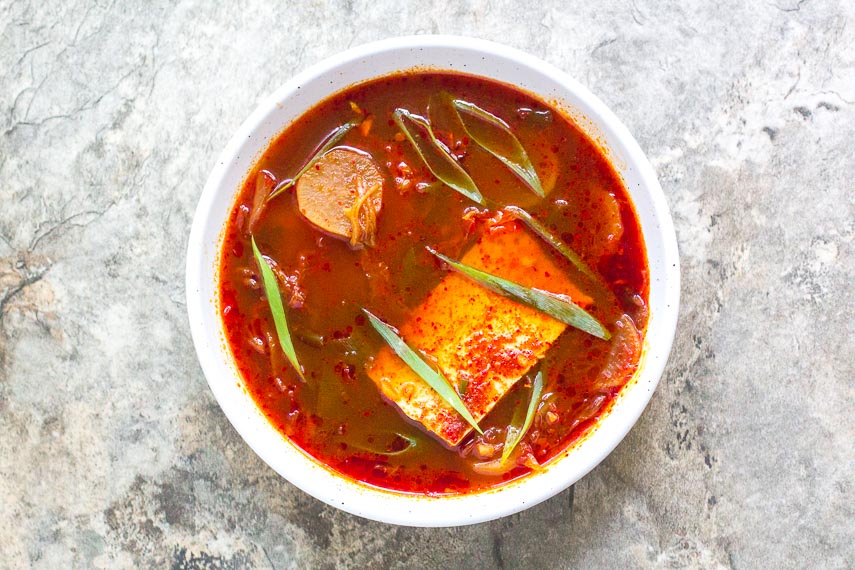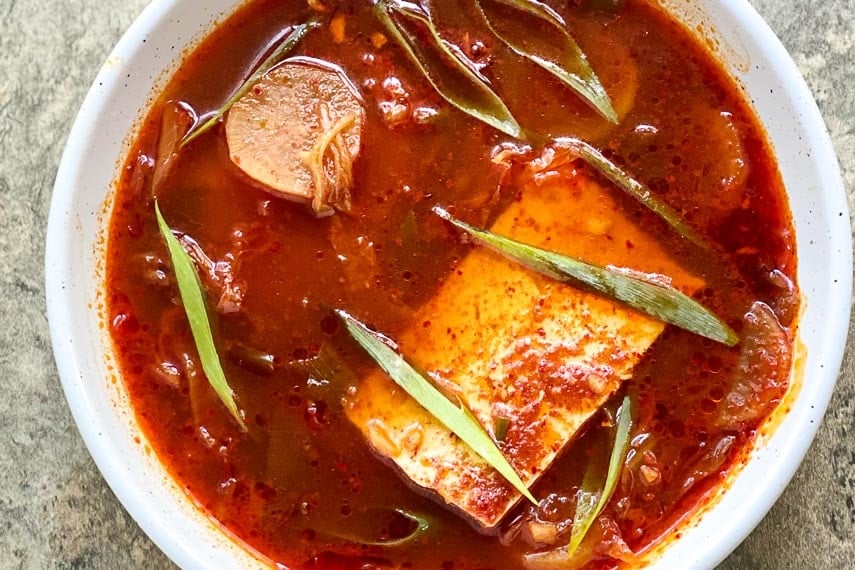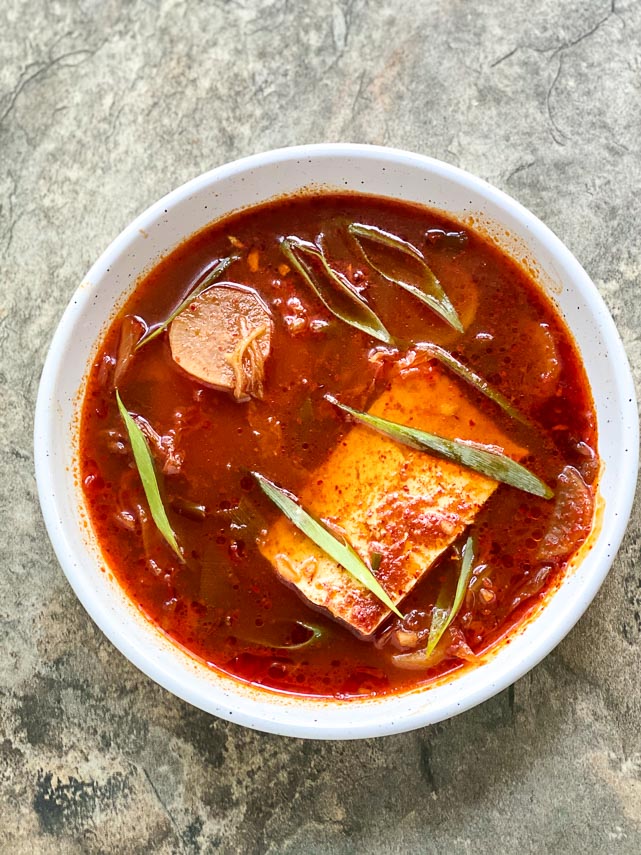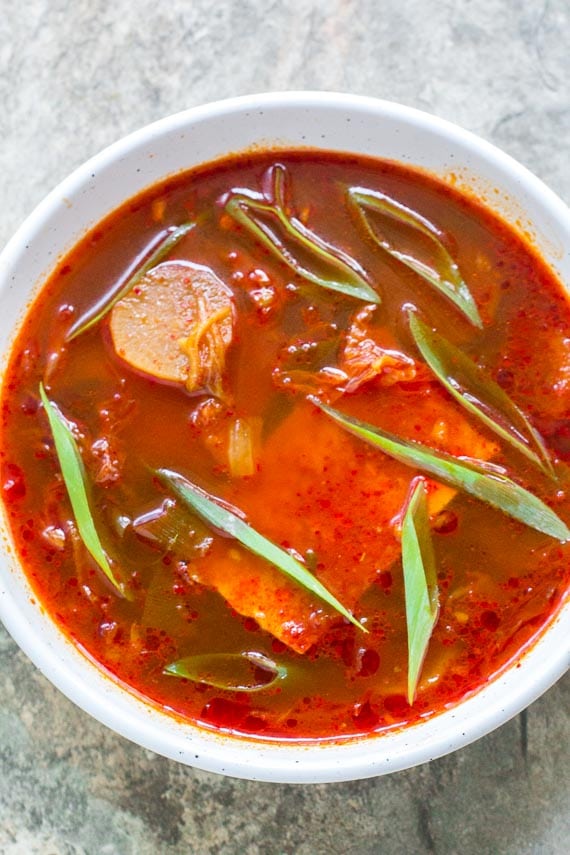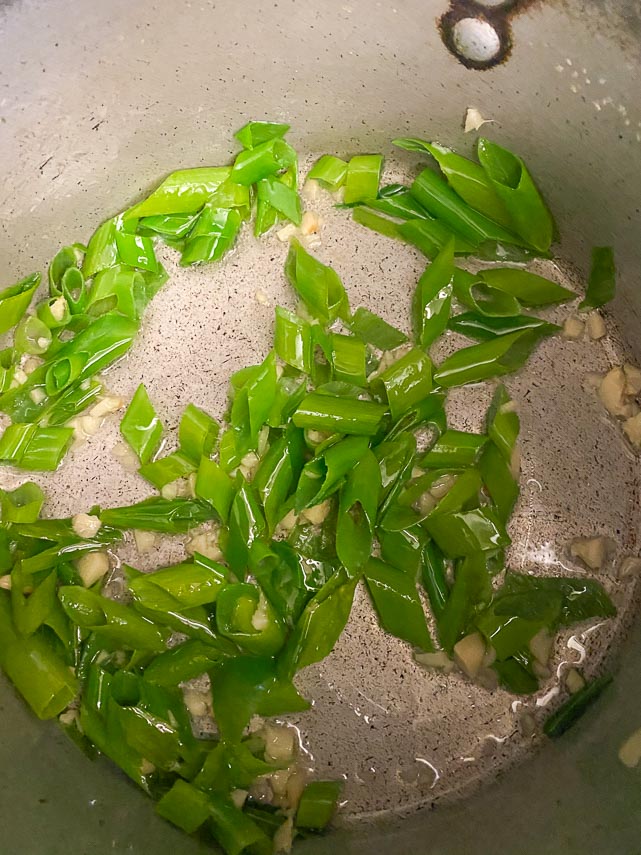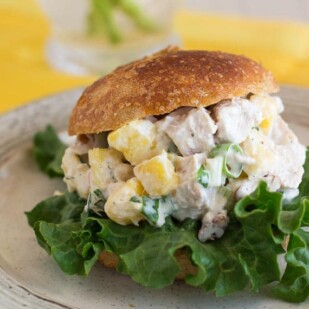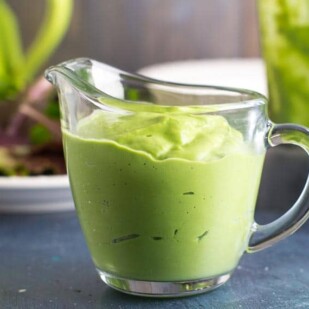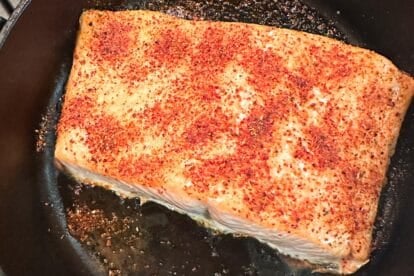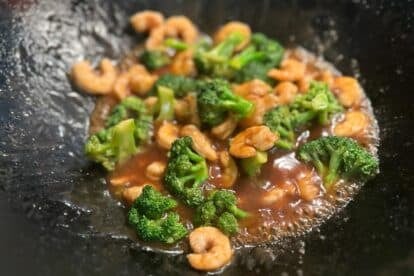Our Low(er) FODMAP Tofu Kimchi Stew comes with a QUIZ. We ask you to answer these questions before making this recipe, because this simple stew with chicken stock, tofu, kimchi and daikon is REALLY spicy and we want to make sure that this is a dish that you – and your gut – will like.
Should You Make Low(er) FODMAP Tofu Kimchi Stew?
Should you make our Low(er) FODMAP Tofu Kimchi Stew? Here are a few questions for you to ponder:
- Do you like REALLY spicy food?
- Does your digestive tract like spicy food?
- Are you a tofu fan?
- Are you willing to make your own low FODMAP kimchi?
- Again, do you like the kind of spicy food that clears out your sinuses and stays with you even after you have stopped eating?
- And last but certainly not least, are you stable digestively and in your Challenge or Integration Phases? We ask this because the recipe contains gochugaru (Korean hot red pepper flakes) in large-ish amounts. It has not been specifically lab tested for FODMAPs. Please also see the section below titled HOT PEPPERS!
If you answer yes to these questions, then read on! Otherwise, this recipe might not be for you.
Homemade Kimchi
Knowing whether you like spicy food, and whether your digestion can handle it, might be easy for you to answer. But then there is the matter of the kimchi.
We have created a low FODMAP Kimchi recipe for you that does not contain any garlic or onions. It is not necessarily hard to make, but it does require time. The issue is that without it, you really cannot make this recipe for Low(er) FODMAP Tofu Kimchi Stew. That’s because we have yet to find a commercially prepared kimchi that does not contain high FODMAP ingredients.
Also please read our article, Is Kimchi Low FODMAP?
This recipe was inspired by one presented by my alma mater, Bon Appetit. The minute I saw this, I knew I had to make it and feature our low FODMAP Kimchi. Anytime I can incorporate kimchi into my meals, I am a happy girl. A few tweaks were necessary to make it low FODMAP, but the conversion was fairly easy.
As we went to press, Monash provided an update to their app, which shows that they have lab-tested kimchi and that it is low FODMAP in 47 g amounts, which is about ⅓ cup. No further information is given. We contacted Monash and they have confirmed that the kimchi that they tested does contain both onions and garlic and it was an unpasteurized product. Every commercially prepared kimchi will have a different formulation and as always, eat to your tolerances. Personally, I do not do well with the commercially prepared kind that I have tried.
Tofu & FODMAPs
Many folks get confused about soy products. Are they low FODMAP or not? Well, some are (soy sauce) and some are considered high FODMAP (whole soybean soy milk). And tofu? Some is low FODMAP and some is high!
Wait, what? We know that sounds crazy but here are some tofu facts. Extra firm and firm tofu (called firm and plain on the Monash app) are considered low FODMAP because during manufacture the high FODMAP liquid whey is drained away in enough quantity to leave a firm-textured low FODMAP tofu.
Silken and soft tofu get their softer textures due to retaining more of the liquid whey. It is the liquid whey where most of the FODMAPs reside.
The original recipe called for a soft tofu, but for low FODMAP purposes we call for firm or extra-firm.
Chicken Stock = Flavor
So, when we make soups that contain low FODMAP Chicken Stock, if they are a very clear, brothy soup, then the flavor of the chicken stock itself is of prime importance.
Remember all the “spicy” talk at the beginning of this recipe? Basically, there is so much hot pepper in this stew that the chicken stock flavor is a mere ghost. I mean, you cannot substitute water, and the stock does play a roll, just maybe not as much as in some other soups or stews (like our Matzo Ball Soup).
We do like our homemade low FODMAP Chicken Stock, but you can used a commercially prepared item. Check out our Shopping Lists for some recommendations.
HOT PEPPERS!
Please read our article on Chile, Chili & Chillies. Monash and FODMAP Friendly have lab tested a limited amount of spicy chiles and chile products (powders, etc.).
Hot, spicy peppers contain capsaicin, which while not a FODMAP issue, can be a gut irritant issue. This is why you have to know your own limits as far as spicy food goes and how your GI tract handles them. Not to mention your tongue and gums, mouth…if you are not a spicy food fan then that burning sensation is not going to be welcomed.
But for spicy food lovers it is a CRAVING!
The hot pepper in this stew is the same as we used in our kimchi: gochugaru, which are Korean hot red pepper flakes. I buy mine at a local Asian food store. The low FODMAP diet is very much a diet related to serving sizes. The amount of gochugaru in a serving size of our kimchi is quite small. The extra amount in this recipe has led us to call it Low(er) and not Low, when it comes to FODMAPs.
Also note that we have not given this recipe our green kiwi Elimination icon. We know it contains no lactose, hence that designation, but due to the un-tested nature of the gochugaru we do not actually know the levels of fructose, oligos or polyols. Always. eat to your tolerance.
Looks Vegan But It Is Not
BTW you might think this dish is vegetarian and vegan, but there is fish sauce in the kimchi, FYI.
Also, in regards to servings, the small serving size is due to the kimchil. As always, eat to yout tolerance, which might be a larger serving.
How To Make Low(er) FODMAP Kimchi and Tofu Stew
Making our Low(er) FODMAP Kimchi and Tofu Stew is very easy. Make sure that you have read the recipe through and made the low FODMAP Kimchi first – plan ahead!
Then you need either our Low FODMAP Chicken Stock or a purchased equivalent.
Then, simply start by sautéing the roughly chopped scallion greens and ginger. You can see that I cut them on the diagonal, but once the stew is made, it won’t matter that much. You just do not have to chose finely.
Once the scallions are softened, you simply whisk in the stock, soy sauce and hot peppers. The daikon is simmered briefly until crisp tender and then the tofu is added and just needs to be warmed through.
For more quick and easy recipes, we have a round-up for you with plenty of inspiration.
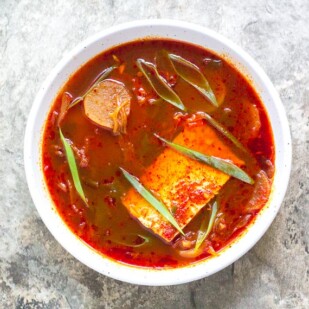
Low(er) FODMAP Tofu Kimchi Stew
Our Low(er) FODMAP Tofu Kimchi Stew combines chicken stock, tofu, kimchi and daikon and is REALLY spicy! Make sure that you can tolerate spicy food before trying this recipe.
Ingredients:
- 1 tablespoon Garlic-Infused Oil, made with vegetable oil, or purchased equivalent
- 1 cup (64 g) roughly chopped scallions, green parts only, plus extra for garnish
- 1- inch (2.5 cm) piece fresh ginger root, peeled and minced
- 4 cups (960 ml) Low FODMAP Chicken Stock
- 3 tablespoons low sodium gluten-free soy sauce, such as San J
- 2 tablespoons gochugaru, Korean hot pepper flakes
- 6- ounces (170 g) daikon, peeled and cut crosswise into ¼ -inch (6 mm) discs
- ½ cup (64 g) Low FODMAP Kimchi
- 14 to 16- ounces (400 g to 455 g) firm tofu, sliced into ¼-inch (6 mm) slabs
Preparation:
-
Heat oil in a deep saucepot over low-medium heat and add 1 cup (64 g) scallion greens and ginger. Sauté until softened, just a few minutes, but do not let them brown. Whisk in stock, soy sauce and hot pepper flakes. Add daikon slices and gently simmer until crisp tender, about 10 minutes.
-
Stir in kimchi, then add slabs of tofu and simmer for about 5 more minutes or until tofu is heated through. Ladle into bowls, garnish with extra scallion greens and serve. You can refrigerate in an airtight container overnight and reheat, but we like it fresh and it is so quick to make, so try to just plan accordingly.
Notes:
Tips
FODMAP Information
Our recipes are based on Monash University and FODMAP Friendly science.
- Daikon: This white radish has been lab tested by Monash and they are low FODMAP in servings of ½ cup (75 g)
- Garlic-Infused Oil: Make your own Garlic-Infused Oil or buy a commercial equivalent for the easiest way to add garlic flavor to your food. Fructans in garlic are not oil-soluble, so garlic-infused oil is low FODMAP.
- Ginger: Monash University has lab tested fresh ginger root and has determined it to be free of FODMAPs, making it one of our go-to no FODMAP foods.
- Scallions: The green parts of scallions are low FODMAP as determined by Monash University lab testing and can be used to add onion flavor to your low FODMAP cooking.
Please always refer to the Monash University & FODMAP Friendly smartphone apps for the most up-to-date lab tested information. As always, your tolerance is what counts; please eat accordingly. The ultimate goal of the low FODMAP diet is to eat as broadly as possible, without triggering symptoms, for the healthiest microbiome.
Nutrition
All nutritional information is based on third-party calculations and should be considered estimates. Actual nutritional content will vary with brands used, measuring methods, portion sizes and more. For a more detailed explanation, please read our article Understanding The Nutrition Panel Within Our Recipes.
